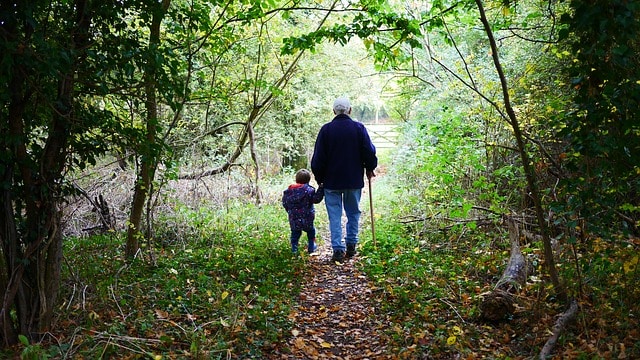As with most parents, picking a name for my children was a bit of a nightmare. My husband and I had many difficulties, as there were too many criteria to fulfill in finding the ideal name. When you start thinking about the name you’re going to give your child, you realize it’s going to determine a massive part of their life – it’s such a huge responsibility and it can feel impossible to decide. To reduce some of those worries for any prospective parents out there, I prepared a little guide in helping to name your kids.
Traditionally, in Turkey, grandparents have a big influence on the naming of their grandchildren. They usually either want to name the child after a beloved ancestor or they have a name in mind they’ve chosen themselves. For some parents, this may not be a problem and they may even be happy to name the child after an ancestor, but for many more I am pretty sure that this can be quite an issue. In cases such as these, generally, the habit is to give two names – a middle name called göbek adı (‘belly name’ as in ‘name given at birth’) and a first name. The choice of each is divided among the parents and grandparent. This solution can frequently work, but on occasions where both sets of grandparents would like to pick a name, then you may not have any real choice in the matter. This is the main reason you’ll see a lot of the same names around, as it is a tradition extending to the Ottoman era of naming children after previous generations.

Another typical local attitude regarding names is to base them on natural events like Volkan (volcano) or Tufan (typhoon), or even names with underlying power like Aslan (lion), Yiğit (hero), Korkmaz (fearless), and Savaş (war). Families with many kids may pick names like Songül (last rose) or even İmdat (help, SOS). I was even once shocked to hear the name Satılmış (meaning ‘sold’). Some families tend to give more religiously aligned names such as Ali or Muhammed, a trait you might commonly find in other religions such as Christianity.
In Turkey, it’s also common to use the names of favorite public figures. For example, many fans of the very popular sitcom Aşk-ı-Memnu named their girls Beren, the original name of the main actress in the sitcom, making it a popular baby name between 2008 and 2010. You may also notice a high frequency in the name İbrahim, likely based on the love for Turkish arabesque singer İbrahim Tatlıses. Every year, TÜİK (Turkey’s Agency for Statistics) compiles a list of the most common names in Turkey. According to this list, Zeynep, Ayşe, Emine, Fatma and Hatice are the most common girl’s names in Turkey. As for men, Mehmet, Mustafa, Ahmet, Ali and Hüseyin are the most prevalent.
One word of warning to consider is there are names which once pronounced with some wordplay, may have another meaning in Turkey – such as Ela which is very close to hela (‘toilets’ in Turkish). It’s funny now, as I didn’t bother to think of this when I named my daughter Ela, thinking it would be a good fit at an international school. So it may be wise to double check with Turkish friends to avoid this kind of situation. That being said, I give this advice with some hesitation, as you shouldn’t share your tentative choices in names with too many people. They may give negative feedback which can affect your judgement. Along the way, you’ll quickly learn that that everybody has an opinion on names. It’s safe to check the meanings, ask about pronunciation and such, but don’t let outside parties have too much influence on your final choice.

As for my experience? When I learned that we were going to have a baby girl, I quickly started thinking of possible names. My first and most important criterion was the length of the name. As our surname is very long, I wanted my child’s name to only be three or four letters, one syllable at maximum. Luckily, there were many alternatives for girls. My second criterion was that the name be easily read and pronounced abroad due to my dual nationality. Being both French and Turkish, my father gave my sisters and me names that are recognized both in French and Turkish (Selin-Céline, Deniz-Denise, Lara). As he has used all the main names, it has been difficult to find new alternatives. If you are in my situation, then I can recommend a few more: Defne-Daphne, Aleks – Alex, Sera-Sarah, İris, Yasemin-Jasmin. If you need some extra help with ideas, please don’t hesitate to contact me.
My final expectation was that the name should have the letter ‘a’ inside, as I had once listened to a name analyst state names including ‘a’ give energy to the person. This is especially true if the name starts with the letter ‘a’. Despite this, I could not find such a name that also matched my criteria. My husband did in fact have one suggestion starting with ‘a’, but I hated it, which brings us to another point. Being in line with your partner is a major challenge in this process. Everyone has their own expectations, which of course can make things difficult. What my husband and I decided to do is create a short-list of three names and then choose after seeing the baby.
Of course, you’ll hear of couples who fall in love with a name very early, sometimes even before pregnancy. I was always a bit jealous of these couples, as it is much easier to have a name before the delivery, especially when you have preparations such as gifts or decorations. Also, when talking to your baby, calling his/her name helps you develop a stronger bond with them.

Regardless, I ended up doing the same thing for my son, and will most probably do so again if I have another child. I find it best to give a name after seeing his or her face for the first time. For my son, it was more difficult, because I had a shortlist of girl’s names in hand, but I could not build a long boy’s names list. To be honest, I was so obsessed with naming my son after his grandfather – my father whom I lost few years ago – that no name was good enough to be in my shortlist. My husband was reluctant to give my father’s name for several reasons, so we had two other alternatives: Emre and Kaan. Emre was a good alternative but my husband already had an Emre in his family, who happens to be a girl, so he was not very convinced. He was more or less ok with Kaan. Stubbornly, I insisted at the most crucial moment of the delivery – the last push before seeing the baby’s head – that he have to accept my favorite name Cem, my father’s name. I am lucky to have such a great husband because he was not obliged to accept this but he did.
I wanted to share some of our experiences to show how challenging it can be to pick a name and to offer some perspective before choosing the ideal name. As a final point, don’t forget that it is not the end of the world if the name is not as ‘perfect’ as you want. The most important thing is that you have a healthy and happy baby. Congratulations!
Do you have any experiences or advice on naming children in Turkey? Let us know in the comments.










As a brit married to a Turk there is the additional criterion of giving a name to a baby (a boy in my case) that will ‘travel’ in both languages and ‘easy’ on the ear. Too many boys’ names in Turkish sound grating in an English context. In the end we gave our son an English name and a Turkish middle name which he uses as he attends school in Istanbul.